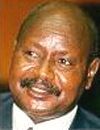Uganda’s elections show vitality and difficulty of elections in Africa
Feb 22, 2006 (KAMPALA) — Uganda’s presidential campaign has demonstrated both the vitality and difficulty of elections in Africa, showing that democratic challenges are now commonplace, but that entrenched regimes will still work ruthlessly to remain in power.
 President Yoweri Museveni appeared set to garner the most votes on Thursday, according to opinion polls, the only question was whether there he will take more than 50 percent, eliminating the need for a run-off election. His main opponent has had to split his time between campaigning and standing trial for treason, rape and other charges he and his supporters maintain were trumped up to hurt him in the election.
President Yoweri Museveni appeared set to garner the most votes on Thursday, according to opinion polls, the only question was whether there he will take more than 50 percent, eliminating the need for a run-off election. His main opponent has had to split his time between campaigning and standing trial for treason, rape and other charges he and his supporters maintain were trumped up to hurt him in the election.
After several democratic, but problematic, elections in a number of African countries, Uganda’s vote is important not only for 27 million Ugandans, but as a symbol for the rest of the continent.
In Ethiopia, the freest elections in the country’s history were held in May, but were marred by widespread irregularities and then violent protests. Parliamentary candidates on both sides appealed results in their districts, but in every case, the ruling party candidate won.
International observers monitoring November’s elections in Zanzibar said voting there was mostly free and fair, but opposition leaders complained that their supporters were kept off the voter register and were denied the right to vote.
Thursday’s voting in Uganda will be the first multiparty elections in Uganda since 1980, a step forward after nearly 20 years of Museveni’s “no party politics.” But the same change to the constitution that allowed the participation of political parties, also removed term limits on the president, allowing Museveni, 62, to run as many times as he wishes.
A decade ago, former U.S. President Bill Clinton declared Museveni a new kind of African leader, committed to democracy, the free market and wholesale reforms. But as early as August 2000, Museveni hinted at his own plans at an African summit in Tanzania when he jokingly advised Clinton that he should reform the U.S. constitution to remove presidential term limits.
Since then, Museveni has frustrated donors by intervening in neighboring Congo’s civil war, increasing military spending and refusing to retire from politics as he had promised during the 2001 elections.
Last year European nations suspended more than US$32 million (A21 million) in budget support for the government. The partial cuts were accompanied by a warning that Uganda appeared be backsliding into authoritarian rule.
After opposition leader Kizza Besigye returned from self-imposed exile last year to run against Museveni for a second time, prosecutors charged him with treason and rape, among other charges, and jailed him for three weeks. Museveni supporters also filed several civil court cases and appeals to have Besigye’s candidacy nullified, efforts that were all eventually thrown out.
“This election right from the word go could never have been free of fair,” Besigye told the Associated Press. “Our objective was to further expose this position both locally and internationally and to use what ever space would be available during the campaign to educate the population … and to hopefully use the tremendous popular discontent to override all of these unfair situations.”
The New York-based watchdog, Human Rights Watch, has expressed concern about Uganda.
“Since 1986 under Museveni, (Uganda) has been the apple of the donor’s eye, but now it is beginning to spoil,” said Jemera Rone, the group’s East Africa coordinator. “The demotion of Museveni from international favor to a slightly lower rank is an acknowledgment of a lot of the structural problems and corruption this government has been plagued with.”
But Museveni’s government has rejected all criticisms. He advised Ugandans to ignore “foreign meddlers” and bragged about how he strengthened his power.
“The constitution had been written in such a way that the president had been held hostage to parliament, I therefore didn’t know whether to resign … or use the old discredited means of force,” Museveni said. “Recently we amended the constitution to make it impossible for parliament to paralyze the president.”
There are numerous election observer groups monitoring Uganda’s vote. Human Rights Watch has appealed to those groups to consider more than the mechanics of balloting when judging whether the elections were free and fair.
How the international community treats Uganda after these elections could determine how sincerely other African leaders embrace democracy when their elections roll around again.
In Chad, President Idriss Deby recently changed his country’s constitution so that he can run again.
“The motivation of course is to stay in power, which is something that seems to grab hold of a lot of leaders across the world when the time comes for them to transition gracefully,” Rone said.
(AP/ST)
